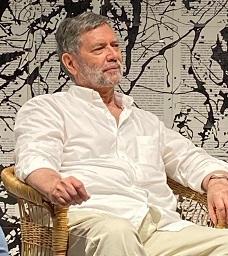Enric Ucelay-Da Cal facts for kids
Quick facts for kids
Enric Ucelay-Da Cal
|
|
|---|---|
 |
|
| Born | 1948 |
| Occupation | Historian, university teacher, writer |
Enric Ucelay-Da Cal is a historian born in 1948 in New York City, United States. He is an expert in contemporary history, which means he studies events from recent times. He has done a lot of important work on the history of Catalonia, a region in Spain. In 2014, he was a Senior Professor Emeritus at the Pompeu Fabra University (UPF) in Barcelona. He also led a research group there that studied states, nations, and how they become independent.
Contents
Early Life and Education
Enric Ucelay-Da Cal's parents, Ernesto Guerra Da Cal and Margarita Ucelay, were Spanish exiles. They had to leave Spain because of the Spanish Civil War (1936-1939). His aunt was Matilde Ucelay.
He went to Bard College in New York City from 1965 to 1969, earning a bachelor's degree. After that, he received a special scholarship called the Woodrow Wilson Scholarship. He then continued his studies at the University of Columbia in New York City. There, he worked with famous historians like Arno Mayer and Robert O. Paxton.
In 1979, he finished his Ph.D. with a big research paper. It was about how Catalan radical nationalism tried to separate from Spain between 1919 and 1933. For this research, he talked to many people and found old Catalan printed materials.
Moving to Spain and Further Studies
In 1972, Enric Ucelay-Da Cal moved to Spain to continue his research. He soon started teaching at the Autonomous University of Barcelona (UAB) in 1974. To become a permanent professor in Spain, he needed to be a Spanish citizen. So, he earned another degree in history from the University of Barcelona in 1980.
In 1983, he completed another doctorate degree at the UAB. This time, his research was about Catalan radical nationalism and its resistance to the dictatorship of Primo de Rivera from 1923 to 1931. To write this, he visited many archives in different countries like France, Italy, and the United Kingdom. These archives had documents that were not available before.
He became a Spanish citizen in 1983 and was able to get a permanent teaching position. From 1983 to 2021, he was married to Mary Dorsey Boatwright. A foundation was created in her name to support the study of contemporary history.
University Teaching Career
From 1983 to 1995, Professor Ucelay-Da Cal was a tenured "Titular Professor" of Contemporary history at the Universitat Autònoma de Barcelona. This means he had a permanent teaching job. He then became a "Senior Professor" at the same university from 1995 to 2006.
Since 2006, he has been a senior professor of contemporary history at the Pompeu Fabra University in Barcelona. He also took part in a big research project from 2009 to 2013. This project, funded by the European Research Council, focused on how states were built in Latin America.
Professor Ucelay-Da Cal also taught as a "visiting professor" at other universities. He taught at Duke University in the United States in 1994 and at Venice International University in Italy in 2002. He was also a "visiting scholar" in Paris in 2004.
Guiding Future Historians
He has guided many students who went on to become important historians themselves. Some examples include:
- Xavier Casals, who is a leading expert on Neo-Nazism in Spain.
- David Martinez Fiol, who was one of the first to research how the First World War affected Catalonia.
- Joan Maria Thomàs, a top expert on the Spanish Falange movement.
- Joan Esculies, a rising scholar who studies Catalan nationalism.
Professor Ucelay-Da Cal has always been open to working with younger researchers. He worked closely with Francisco Veiga, a main Spanish researcher on Eastern Europe. More recently, he has also worked with Arnau Gonzàlez i Vilalta, a younger Catalan historian. They have prepared books and projects on important and sometimes debated topics in Catalan history.
Historical Research and Ideas
Professor Ucelay-Da Cal's main work has been on the recent history of Spain and Catalonia. He studies both Spanish nationalism and Catalan nationalism. He has also looked at specific topics, like the role of the Estat Català movement, which sought Catalan independence. This was important before and during the Second Spanish Republic and the Spanish Civil War.
He believes it is important to pay more attention to regional differences when explaining a country's history. He has also studied populism in Spain and how it connects to similar movements in Latin America. When studying the Spanish Civil War, he has suggested using ideas from the study of religion to understand many trends that are usually seen as only political. He often questions common ideas about contemporary Spanish history.
See also
 In Spanish: Enric Ucelay-Da Cal para niños
In Spanish: Enric Ucelay-Da Cal para niños
 | Ernest Everett Just |
 | Mary Jackson |
 | Emmett Chappelle |
 | Marie Maynard Daly |

